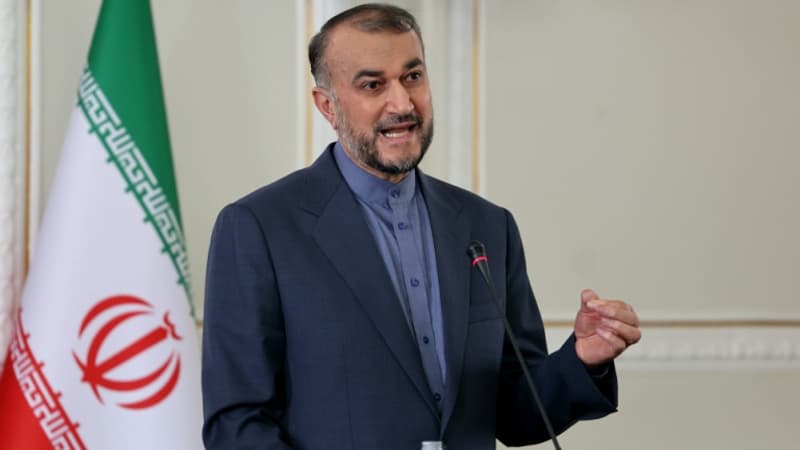This is a statistic that contrasts with the trend of recent weeks. “In October, Iran overtook Saudi Arabia as China’s largest maritime oil supplier (Russia remains first when pipeline flows are taken into account), thanks to the massive reduction of crude oil stocks in floating tanks, it said. on Friday Homayoun Falakshahi, an analyst at Kpler, the “
Since the escalation of tensions between Israelis and Palestinians, many analysts have had their eyes fixed on Tehran. “A possible involvement of Iran,” a major producer and member of the Organization of the Petroleum Exporting Countries (OPEC), “in Gaza would cause a serious disruption of global oil supply in the medium term,” recalled Ipek Ozkardeskaya, an analyst at Swissquote. Bank, just ten days after the Hamas attack. An attention confirmed more recently by Barbara Lambrecht, analyst at Commerzbank:
Excessive sanctions
This entry of black gold was decisive in containing prices in a context of supply shortages following production and export reductions by some OPEC members and their allies. Therefore, investors fear a further tightening of supply in case Tehran becomes involved in the war between Israel and Hamas. “It is almost certain that this scenario would affect the global supply of oil and could raise the price of a barrel to levels above one hundred dollars,” Ricardo Evangelista, an analyst at ActivTrades, anticipated ten days ago.
And rightly so: such an intervention would lead to stricter enforcement of US oil sanctions against Iran, long-standing supporter of the Islamist movement Hamas, resulting in lower supply on the market by Tehran. After seeing its production and exports undermined by years of international sanctions, Iran has increased its production in the last twelve months and is suspected of smuggling barrels into the market. Enough to encourage Javies Blas, of the Bloomberg agency, to question the effective application of these sanctions in the face of the recent liquidation of the enormous floating Iranian oil reserve:
A strategic blockade of the Strait of Hormuz
According to DNB analyst Helge André Martinsen, “the Biden administration turned a blind eye” to this increase in production due to its positive effects on the market (see above). Even if Tehran stayed out of the conflict, “the West could decide to strengthen sanctions against Tehran or simply apply existing sanctions more effectively,” says Edoardo Campanella. Iran could respond by blocking the Strait of Hormuz, between Oman and Iran, the most important oil transit zone in the world, with a daily flow of more than 17 million barrels, according to Seb Research, or 30% of all traded oil. by sea. . According to the UniCredit analyst, only Saudi Arabia and the United Arab Emirates have pipelines that allow crude oil to be transported out of the Gulf, without passing through the Strait of Hormuz.
The worst case scenario, unlikely but not impossible according to analysts, would be that, in the event of tightening sanctions, Iran would respond by attacking Saudi oil facilities, one of the main producers and exporters in the world, as Edoardo Campanella pointed out. In September 2019, attacks on oil infrastructure in Saudi Arabia temporarily halved the country’s production for the price of Brent to rise almost 20% in one day. They had been claimed by Yemeni Houthi rebels supported by Tehran.
The violence that threatens to spread in the Middle East contradicts the policy of regional appeasement advocated by Saudi Arabia, which has moved closer to its main rival, Iran, in recent months. Riyadh had also started talks on possible normalization with Israel, but the talks were suspended after the start of the war. The kingdom is halfway through an ambitious reform program, titled Vision 2030, led by its crown prince Mohammed bin Salman, to reduce its dependence on oil.
The price of oil sensitive to the “less development” of the conflict
Let us remember that the attack that left hundreds dead in a Gaza hospital almost two weeks ago had already provoked virulent reactions from the Iranian authorities. President Ebrahim Raïssi declared a day of national mourning and predicted that the attack on the hospital would turn against Israel and its American ally and sign “the end of the Zionist regime.” “The ambassadors” of Israel “must be expelled and the embassies closed” in these countries, he added, as long as Iran does not maintain diplomatic relations with Israel, which it wants to disappear.
During his trip to Saudi Arabia, Foreign Minister Hossein Amir-Abdollehian also called on oil-producing countries to impose an embargo on supplies to Israel, a measure that was ultimately not adopted by the 57 members of the Organization of American States. Islamic Cooperation (OIC). Although they had no concrete effects, these departures by Iranian leaders caused oil prices to increase between 2% and 3%.
“Oil remains the main barometer of geopolitical risk because prices rise when the war premium increases,” said Edward Moya, an analyst at Oanda. But this analyst put the increase in perspective by noting that, so far, there have been “little disruptions in crude oil supply.” “For this reason, oil continues to trade around the levels observed after the first price increase following Hamas’ surprise attacks against Israel” on October 7, he stressed.
However, crude oil prices rose again on Thursday after US airstrikes targeted Iranian targets in Syria. “Tensions in the Middle East will not ease in the short term and this could potentially lead to disruptions in Iran’s crude oil exports,” Edward Moya added. On Thursday, before the United Nations, Hossein Amir-Abdollahian declared that Iran did not want the conflict to spread. “But I warn that if the genocide in Gaza continues, you will not be spared from this fire,” he added, addressing the United States.
Source: BFM TV


